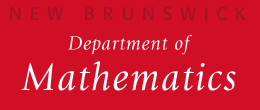The Mathematics Department offers an Actuarial Mathematics Option for those students who want to enter the actuarial profession upon graduation. Graduates of this option have the foundation needed to prepare for three of the Society of Actuaries Exams (P, FM, and MLC), and to earn certifications in statistical and economic subject areas once the student enters into the profession.
Generally, students who want to become actuaries will seek an internship with an insurance company or consulting firm between their junior and senior years. Many of these firms actively recruit at Rutgers through Rutgers Career Services.
Some students interested in the actuarial profession shoud consider a major in mathematics and a minor in economics, or a double major in mathematics and economics, rather than the Actuarial Mathematics option. This includes students who intend to pursue a broader mathematical education, possibly including graduate studies in mathematics, as well as those planning to continue on to graduate study in Mathematical Finance.
The major in actuarial mathematics requires 66 credits, primarily in mathematics and economics.
- Core Courses (30 credits)
- Mathematics
- Calculus I-IV: Math 151, 152, 251, 252
- Linear Algebra: Math 250
- Economics
- Micro-economics and Macro-economics: Econ 102, 103
- Computer Science and Statistics
- CS 107 or 111
- Stat 211 or 285
- Required Upper Level Courses (18 credits)
- Mathematics
- Interest Theory: Math 285 (or Actuarial FM exam)
- Probability: Math 477
- Life Contingencies I: Math 486
- Economics
- Intermediate Micro: Econ 320
- Intermediate Macro: Econ 321
- Econometrics: Econ 322
- Electives (18 credits)
- Mathematics: four upper level courses required (300 or above)
- Recommended for Actuarial Mathematics—4 of:
- Math Finance: Math 485
- Math Statistics: Math 481
- Stochastic Process: Math 478
- Life Continencies II: Math 487
- Linear optimization: Math 354
- Numerical Analysis: Math 373
- Economics or additional mathematics:
2 of the following courses, or one of the following and an additional upper level mathematics course. - Economic Forecasting: Econ 421
- Financial Economics: Econ 413
- Economics of Uncertainty: Econ 481
Admission to the program: Students may be admitted to the program upon completion with grades of C or better of three terms of calculus, Math 285, Econ 102, and Econ 103.
Completion of the program requires grades of C or better in all but one of the required or elective courses.








